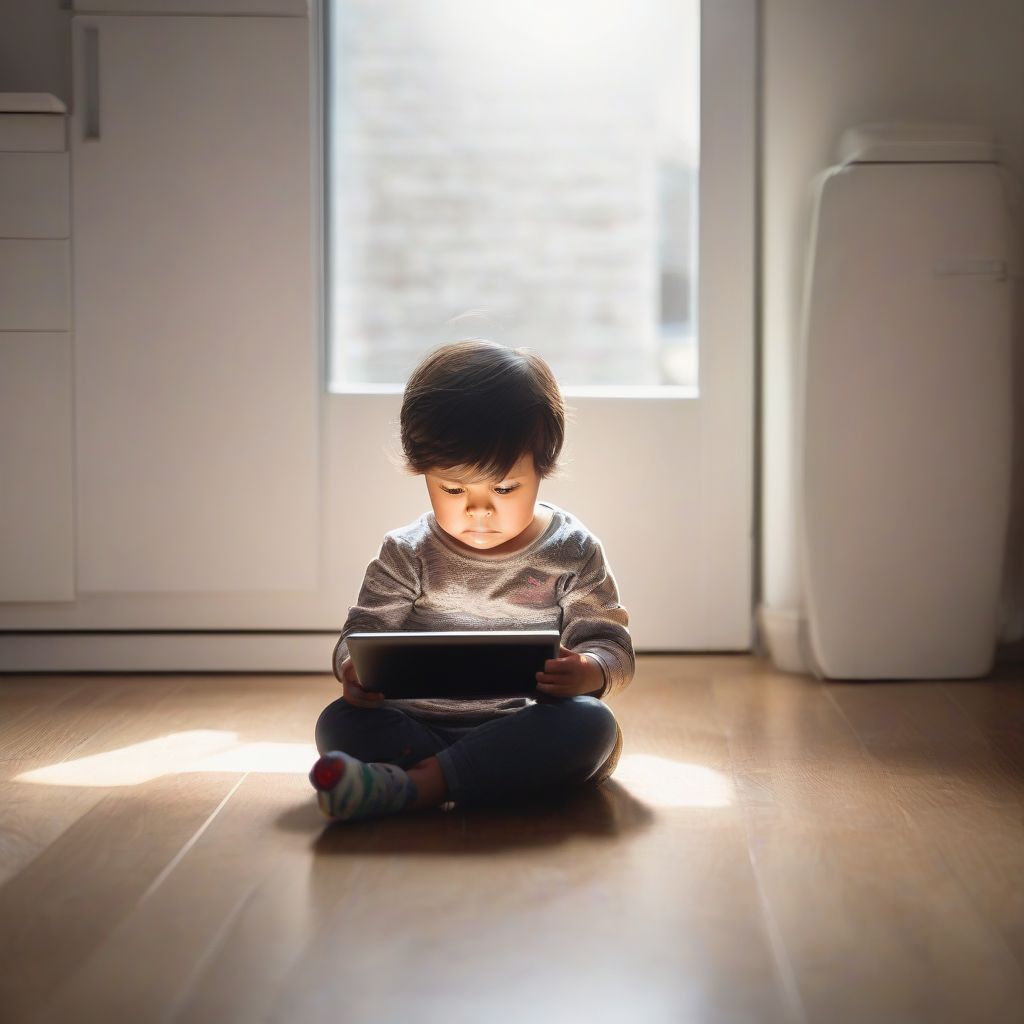As a nutritionist and meal prepping coach, I’m deeply passionate about healthy living, and that includes healthy development for our little ones. Over the past 8 years, I’ve helped countless individuals achieve their wellness goals. But today, let’s dive into a topic that’s increasingly relevant in our tech-filled world: the impact of screen time on early childhood development.
Think about it: how often do you see toddlers glued to smartphones or preschoolers engrossed in tablets? While technology offers fantastic educational tools, excessive screen time can have significant consequences for a child’s developing brain.
Understanding the Crucial Stages of Early Development
The first few years of a child’s life are a period of rapid brain development. Every interaction, every experience, shapes their cognitive, social, and emotional growth. This makes it a critical window of opportunity, but also a period of vulnerability.
The Downside of Excessive Screen Time
 Toddler Staring at Tablet
Toddler Staring at Tablet
Excessive screen time can have a range of negative effects:
- Language Delays: Research suggests a link between excessive screen time and delays in language development. This is because face-to-face interactions, which are crucial for language acquisition, are often limited when a child is glued to a screen.
- Attention Problems: Rapidly changing images and stimulating content on screens can make it challenging for children to develop sustained attention spans. This can lead to difficulties in school and other areas of life.
- Sleep Disruption: The blue light emitted from screens can interfere with melatonin production, a hormone that regulates sleep. This can result in sleep disturbances, impacting a child’s mood, behavior, and overall well-being.
- Reduced Physical Activity: When children spend excessive time in front of screens, it often comes at the expense of physical activity, leading to potential issues like obesity and other health problems.
- Social and Emotional Challenges: Real-world interactions are crucial for developing social skills, empathy, and emotional intelligence. Excessive screen time can limit these opportunities, potentially leading to difficulties in forming meaningful relationships.
Striking a Healthy Balance: Tips for Parents and Caregivers
Now, before you banish all screens from your home (let’s face it, that’s not realistic!), remember that balance is key. Here are some practical strategies:
1. Set Realistic Screen Time Limits
The American Academy of Pediatrics recommends these guidelines:
- Under 18 months: Avoid screen media other than video chatting.
- 18 to 24 months: Choose high-quality programming and watch it with your child to help them understand what they’re seeing.
- 2 to 5 years: Limit screen use to 1 hour per day of high-quality programs.
2. Prioritize Interactive Activities
Encourage activities that promote development:
- Reading Together: Snuggle up with a good book! Reading aloud fosters language development, imagination, and bonding.
- Creative Play: Engage in imaginative play, arts, and crafts. These activities boost creativity and problem-solving skills.
- Outdoor Adventures: Head outside for some fresh air and exercise. Parks, playgrounds, and even your backyard offer endless opportunities for exploration and fun.
3. Be a Positive Role Model
Children learn by watching the adults in their lives. Be mindful of your own screen time habits.
4. Establish Screen-Free Zones
Create designated areas, like the dinner table and bedrooms, as screen-free zones to encourage face-to-face interaction and better sleep.
5. Choose Quality Over Quantity
When you do allow screen time, select high-quality, educational programs. Look for shows that are age-appropriate, engaging, and encourage interaction rather than passive watching.
6. Make Screen Time a Shared Experience
Instead of using screens as a babysitter, watch with your child and engage in conversations about what you’re watching. This helps them process information and promotes bonding.
The Power of Connection
Remember, our children crave connection. They thrive on loving interactions, playful moments, and the world around them. By being mindful of their screen time and prioritizing real-world experiences, we can help them develop into healthy, well-rounded individuals.
Conclusion
The early years are a critical period for a child’s development, and excessive screen time can have a lasting impact. By understanding the potential risks and implementing healthy screen time habits, we can empower our children to thrive in a world that’s increasingly digital. Remember, balance is key! Prioritize face-to-face interactions, encourage active play, and choose quality over quantity when it comes to screen time.
Let’s work together to raise a generation that’s tech-savvy but also connected to the world around them!
What are your thoughts on managing screen time in your household? Share your tips and experiences in the comments below!
Looking for more parenting advice? Check out these helpful articles:
- The Impact of a Healthy Family Lifestyle on Children’s Development
- The Impact of Physical Activity on School-Aged Children’s Health
- The Role of Parents in Early Childhood Learning
[amazon bestseller=”The Whole-Brain Child”]
